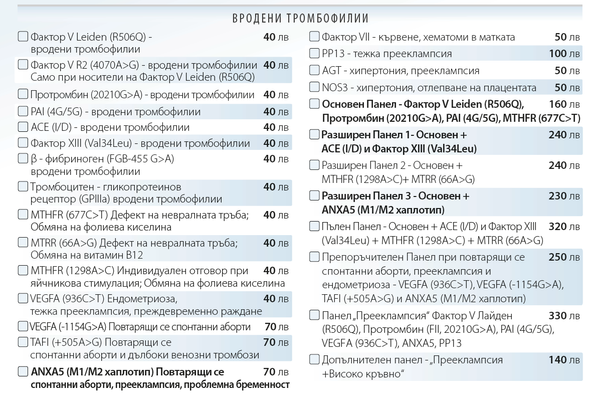Predispositions to Cardiovascular Disease (CVD12)
The CVD12 genetic panel identifies 12 genetic variants associated with an increased risk of developing coronary artery disease, pulmonary thromboembolism, atherosclerosis, hypertension, and others. cardiovascular diseases. Risk factors include hypercoagulation, increased homocysteine, folate deficiency (Vitamin B9), increased fibrin formation, defects in the regulation and transport of cholesterol, decreased protection of cardiomyocytes.
Diagnostic Range: Genetic variants in the genes Factor V Leiden (FV), Factor V R2 (FVR2), Prothrombin (FII), Factor XIII (FXIII), β-Fibrinogen (FGB), Plasminogen Activator Inhibitor (PAI), Glycoprotein IIIa ), Methyltetrahydrofolate reductase (MTHFR 677C> T), Methyltetrahydrofolate reductase (MTHFR 1298A> C), Angiotensin converting enzyme (ACE), Apolipoprotein B (APOB), Apolipoprotein E (APOE) are analyzed
Diagnostic Method: PCR / Hybridization
Research Material: 6 ml venous blood / 2 ml peripheral blood
Results within: 10 business days
Fee: BGN 350
Clinical application
Cardiovascular diseases
Congenital Thrombophilia
This test analyzes genetic factors related to disorders of the coagulation system and the risk of increased blood clotting, as well as the risk of hypofibrinolysis.
Indications for the test are one or more miscarriages in the family, stillbirth, fetal growth retardation, preeclampsia, preparation for an in vitro procedure, use of hormonal contraceptives, varicose veins, cardiovascular disease in the family.
Number of Markers Tested:: 16
Polymorphisms Included: : Blood coagulation factors: FVL (R506Q), FII 20210G> A, FVII p.R353Q, FXIII p.V34L, FGB c.455G> A Fibrinolysis: PAI 4G / 5G, GPIIIa c.155T> C, TAFI c.505A> G Folate cycle: MTHFR c.77C> T, c.1298A> C, MTRR c.6A> G Other factors: ANXA5, VEGFA c.936C> T, c.-1154G> A, PP13, ACE (I / D)
Research Material: Venous or capillary blood with K2EDTA (purple tube)
Results within: 5-10 business days
Fee: BGN 40 - BGN 330, depending on the prescribed combination of polymorphisms
Diseases and Conditions
Family history of miscarriage ; Stillbirth; Fetal growth retardation; Preeclampsia; Preparation for in vitro procedure; Use of hormonal contraceptives; Varicose veins; Family history of cardiovascular diseases
Download Our Brochure
Clopidogrel Therapy (Plavix)
Pharmacogenetics in cardiology allows the identification of patients at risk of severe toxicity or those who are likely to benefit from a particular treatment. Thus, it helps to design individualized cancer therapy.
Diagnostic Range: CYP2C19
Diagnostic Method: Sanger sequencing
Research Material: Venous blood
Results within: 5-10 business days
Fee: BGN 120
Clinical application
Personalized therapy
Warfarin Therapy (Sintrom)
The Pharmacogenetics in Cardiology allows identification of patients at risk of severe toxicity or those who are likely to benefit from a particular treatment. Thus, it helps to design individualized cancer therapy. There are significant differences between the pharmacogenomics of cancer and other diseases.
Diagnostic Range: CYP2C9, VKORC1
Diagnostic Method: Sanger sequencing/ RFLP
Research Material: Venous blood
Results within: 5-10 business days
Fee: BGN 120
Clinical application
Personalized therapy
Statin Therapy
The Cardio Pharmacogenetics allows identification of patients at risk of severe toxicity or those who are likely to benefit from a particular treatment. Thus, it helps to design individualized cancer therapy. There are significant differences between the pharmacogenomics of cancer and other diseases.
Diagnostic Range: Statin Therapy: Simvastatin, Pravastatin, Rosuvastatin
Diagnostic Method: Sanger sequencing
Research Material: Venous blood
Results within: 5-10 business days
Fee: BGN 100
Clinical application
Personalized therapy
Next-Generation sequencing (NGS)/ Whole Exome Sequencing (WES)
This test detects mutations in 20,000 genes associated with various hereditary conditions. It analyzes packages of target genes associated with specific conditions according to clinical diagnosis (Cancer Panel, Pediatric Panel, Diabetes Panel, Epilepsy Panel, Intellectual Deficiency/Autism Panel, Skeletal Dysplasias Panel, Cardiomyopathies Panel, etc.).
Diagnostic Range: ~20 000 genes
Diagnostic Method: Next-Generation Sequencing
Research Material: Venous blood
Results within: 2 to 4 months
Fee: BGN 3800
Clinical application
Cancer, childhood diseases, diabetes, epilepsy, intellectual deficit/autism, skeletal dysplasia, cardiomyopathies, etc.

